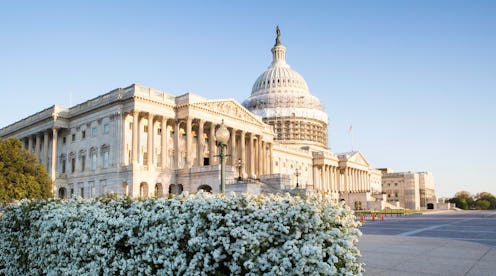News
There's More Than Just The President To Vote For

Don't look now, but the 2016 presidential election is almost here. The big day is Nov. 8, and assuming you haven't taken advantage of early or absentee voting already, that'll be your very last chance to cast your vote, whether it's for Republican nominee Donald Trump, Democratic nominee Hillary Clinton, Green nominee Jill Stein, Libertarian nominee Gary Johnson, or independent conservative candidate Evan McMullin. But those aren't the only names that'll be on your ballot ― you'll vote in the presidential and congressional elections at the same time, meaning you'll want to know exactly who you're supporting in your state races, too.
While not everyone will have a Senate candidate to vote for this time around ― only 34 of the 100 members of the U.S. Senate are currently up for reelection, having reached the end of their six-year terms that began in 2010. Everyone, however, will have a House representative on the ballot, as House terms run just two years, and are up on every even year.
As such, any time there's a presidential election happening, it'll also be time for you to make a call on the representative from your congressional district. There are 435 seats in the House, and each and every one of them will be on ballots all throughout the country.
What that means in practical terms is that you ought to spend some time in the coming days reading up on your state candidates, as well as local ones, who can have a big impact on day-to-day life within your community. Even if you're not as engaged with non-presidential politics, which is true of a lot of people (diminished turnout in mid-term elections demonstrates this), it's important to try to inform yourself as well as you can.
And regardless of who you're voting for ― assuming it's one of the two major-party candidates ― they're going to need supporters in Congress to get anything done. If there's anything the last several years of the Obama era have demonstrated pretty well, it's that divided government lends itself to gridlock, especially when one party is as intractable as the Republicans have been over the last eight years.
The makeup of Congress could have big implications for the Supreme Court, too, considering that at least one high-profile GOP elected official has made noise about refusing to confirm any potential justices a President Clinton might nominate, to say nothing of what might happen is Trump were the one putting the names forward. Simply put, do yourself a favor and carve out a few minutes to familiarize yourself with your candidates, because it's a drag to feel stranded when you're in the voting booth.
Image: Cyvandyke/Shutterstock (1)